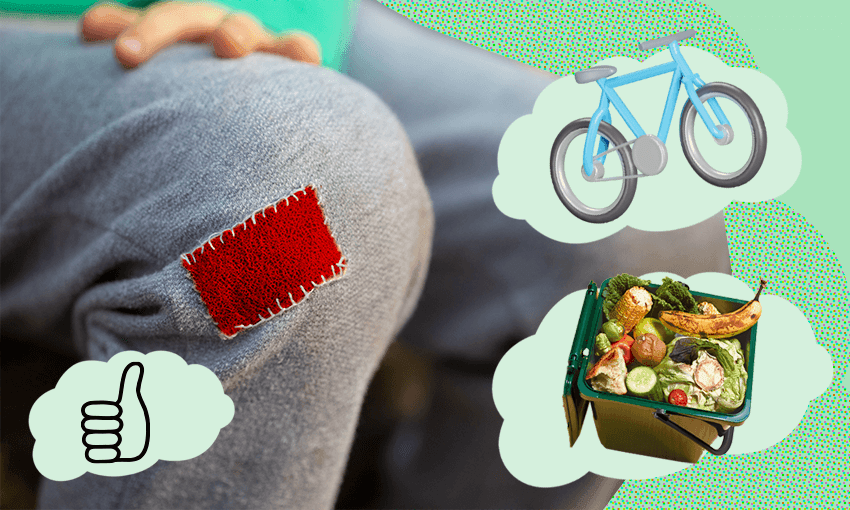Achieving complete sustainability may be an unattainable goal, but there are ways in which we can all make small changes to be part of a bigger sustainability movement. Olivia Sisson asked one expert for their tips.
Everything “comes back” full circle at some stage. Crocs, once ridiculed, have gone couture. Adidas returned from the void, and so did cloth nappies. A friend’s brother and his partner were set on using them – but after two weeks with bubs, they thought “forget it”. Turns out the sustainable option sometimes just isn’t… sustainable.
Tips on how to live more sustainably range from reusing your straw to rearranging your entire life, without much in between. In terms of actually useful, non-annoying sustainability advice, a chat with Kayleigh Appleton from The Compost Collective turned up heaps. She had recommendations for almost every area of life…
Kai
There’s a lot of low-hanging fruit in this area (pun intended).
First and foremost, eat up. You can compost food waste but prevention of waste in the first place is always the most preferred and sustainable outcome. Don’t let your fridge become a graveyard for fresh fruit and veg. The cost of these items is up 23%. Let that stat and sustainability motivate you to eat all the food you buy.
Consider where you buy your kai, too. Supermarkets are convenient, but farmers markets and vege boxes are often more sustainable and cheaper. They offer produce with fewer diesel miles and less packaging – an area in which supermarkets are sometimes not even trying.
A huge amount of food gets wasted by our supermarkets. The minimally blemished but perfectly good to eat food they reject often ends up in landfill. Up to 40% of food doesn’t even leave farms because of these narrow requirements. Companies like Perfectly Imperfect and Wonky Box rescue that kai – check out their vege boxes.
And download the Foodprint app. Simply put in your location and it will pull up a list of nearby eateries selling off excess stock. Afternoon half-priced pastry? Sign me up.
Also check out all sorts of tips about how to reduce food waste, including tasty recipes, and upcoming workshops at the Love Food Hate Waste website.
Composting
Of course, we’re only human. Food waste will happen from time to time. However, about 45% of the average Auckland bin is food waste. That waste ends up in landfill, the least preferable and sustainable outcome. There it gets squished up, breaks down without oxygen and emits methane which heats the place up. Dealing to your food waste in a better way is one of the most impactful things you can do – and composting keeps the precious nutrients food scraps contain within our food system.
So where to start? If you have room, setting up a compost bin is easy. The Compost Collective offers free startup workshops which will answer all your Qs on how to compost like a pro. They’ll also hook you up with big discounts on composting bins and the Bokashi system – a great option if you don’t have heaps of space.
If composting isn’t for you, many communities have food waste drop off hubs. And in Auckland, you can use the ShareWaste app to book a composter to come pick up your food waste for free. Easy as.
Single use stuff
Keep Cups are great, but I never seem to have mine with me at the right time. Try making a “reusable pack” instead – a little baggie with reusable cups, containers, cutlery, straws. Leave it in your backpack, your car, at work or anywhere you spend a lot of time. This will help reduce the remembering required.
Grow your own
With grocery prices soaring, “grow your own” messaging is everywhere. A great option if you have the land and money to make it happen. Even if you do, there can be tons of plastic and other nasties involved, from seedling trays to soil bags and harmful fertilisers. To get growing in a green way, connect with community gardens. They often sell seedlings, materials or can point you towards sustainable suppliers.
Travel
It’s unlikely that Aotearoa stops travelling. But jumping in a jet even once could offset your Keep Cup use in just a few hours. So how to be mindful in this space? Slow travel could be the answer. Visiting one place, or country, instead of five. And of course, taking your reusable pack with you.
Clothes
Make them. Mend them. Keep wearing them. The first two are more easily said than done, but local markets and maker spaces around the country like Rekindle can teach you how to mend things, do it for you for a fee, or connect you with someone who can. Leveraging other people’s skills to be more sustainable, rather than relying solely on your own, can be a huge help.
Kids
Kids require a shite ton of stuff. Nappy bags. Toys. A variety of carrying contraptions. This area of life feels like a bit of a minefield on the low impact front. But there are some great resources out there designed to help parents. Like these workshops from Kate Meads on how to make cloth nappies actually work. This directory from Ethically Kate has great recommendations on sustainable baby and pregnancy brands, too.
From clothes to kitchen supplies, Trade Me simply cannot be overlooked. Buying second hand, or selling things you no longer need, is an excellent way to prevent waste.
Pets
Dogs can help keep food scraps out of landfill, too. Recent research suggests that adding some to their diets could even be beneficial. Be sure to research what can and can’t be shared with them though.
With pets it’s helpful to remember you’re always upstream from someone. And when pet waste gets into our waterways it harms our ecosystems. One parasite found in cat poo is killing Maui and Hectors dolphins. At the least, don’t just leave it there. And if you want to go further, compost pet waste with this easy-to-use system and watch your flowers flourish.
Work
If you’ve got the option or are vying for it, working from home could reduce your transportation footprint. Especially if you drive. If your boss isn’t convinced that WFH will save the planet, they’re probably right. It’s just one piece of a bigger puzzle. But this excellent paper could help you kickoff conversations in the workplace around reducing impact and creating a WFH plan that actually slashes it.
Get amongst
Keep an eye out for sustainability events in your community. In Auckland, EcoFest is on now until April 16th. There are over 300 events from free home energy advice sessions to mauri noho (conscious living) workshops. And anyone around the motu can jump into The Compost Collective’s free composting workshops via Zoom.


